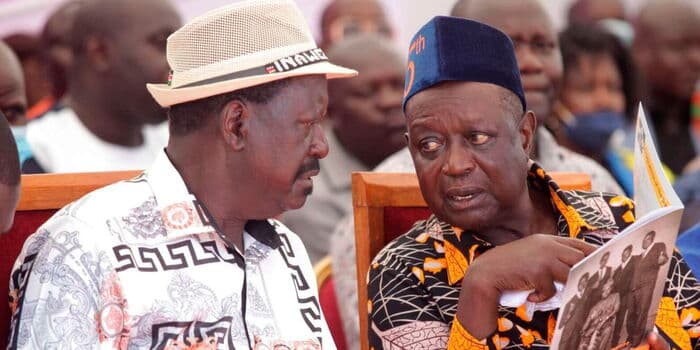We're loading the full news article for you. This includes the article content, images, author information, and related articles.
In a candid interview, Senator Oburu Oginga discloses for the first time the specific ailment that led to his brother's withdrawal from public life, providing Kenyans a clearer picture of the former Prime Minister's final days.

NAIROBI, KENYA – Senator Oburu Oginga has revealed that his late brother, former Prime Minister Raila Odinga, was being treated for a blood clot in his head in the weeks leading up to his death. The disclosure, made during an interview with NTV on Sunday, November 2, 2025, sheds new light on the health challenges Mr. Odinga faced before he succumbed to a cardiac arrest in India on October 15, 2025.
Mr. Odinga, a towering figure in Kenyan politics for decades, passed away at the age of 80. His death occurred at Devamatha Hospital in Koothattukulam, Kerala, after he collapsed during a morning walk at a nearby Ayurvedic treatment centre where he was recuperating. His office confirmed the death, which sent shockwaves across Kenya and the East Africa region.
In the interview, Senator Oginga explained that doctors in Nairobi had discovered the clot and prescribed strong medication to dissolve it. This treatment, he said, led to the former Prime Minister feeling weak and tired, forcing his withdrawal from public engagements. This clarifies why Mr. Odinga was absent from several key events, including the burial of former minister Dalmas Otieno and the postponement of his Orange Democratic Movement (ODM) party's 20th-anniversary celebrations.
“It was some clot that was discovered on his head, and it was being dissolved by our doctors here in Nairobi,” Senator Oginga stated, adding, “He was not in critical condition... but he was feeling weak and tired because of that kind of medication.”
This account provides crucial context to the Senator's earlier, more guarded statements in mid-October, where he had confirmed his brother was “indisposed” and “recuperating well in India” but dismissed rumours of a critical illness.
Mr. Odinga's last public appearance was on September 22, 2025, when he chaired an ODM Parliamentary Group meeting. His subsequent absence fueled widespread speculation about his health, which his office initially dismissed as politically motivated misinformation.
The Senator also recounted the emotional turmoil of learning about his brother's sudden passing. He had spoken to Mr. Odinga just hours before he died, making the news of his collapse and subsequent death profoundly shocking for the family. “I called Ruth [his sister in India], and before I could ask her anything, she just told me, 'We have lost him.' Then I called Winnie, and she said, 'Uncle, we have lost the battle.' That is when I almost collapsed,” he shared.
Following Mr. Odinga's death, his body was repatriated to Kenya, arriving at Jomo Kenyatta International Airport (JKIA) on Thursday, October 16, 2025, to an immense gathering of mourners. The government declared a public holiday and accorded him a state funeral, with a public viewing held at Kasarani Stadium.
Addressing logistical questions that arose during the funeral, Senator Oginga clarified why there appeared to be two different coffins. He explained that the initial casket from India was purely for transportation. The family had intended to transfer the body to a formal presentation casket at the airport or a funeral home, but the sheer size and emotion of the crowd at JKIA made this impossible. The final preparations were instead carried out at a controlled section of Kasarani Stadium by the Lee Funeral Home team before the public viewing commenced.
Mr. Odinga was laid to rest on Sunday, October 19, 2025, at his family's ancestral home in Kang'o Ka Jaramogi, Bondo, Siaya County. His gravesite has since become a point of pilgrimage for leaders and citizens paying their respects. Senator Oginga’s recent revelations have provided a deeply personal and clarifying account of the private health battle that preceded a profound national loss.
Keep the conversation in one place—threads here stay linked to the story and in the forums.
Sign in to start a discussion
Start a conversation about this story and keep it linked here.
Other hot threads
E-sports and Gaming Community in Kenya
Active 9 months ago
The Role of Technology in Modern Agriculture (AgriTech)
Active 9 months ago
Popular Recreational Activities Across Counties
Active 9 months ago
Investing in Youth Sports Development Programs
Active 9 months ago
Key figures and persons of interest featured in this article